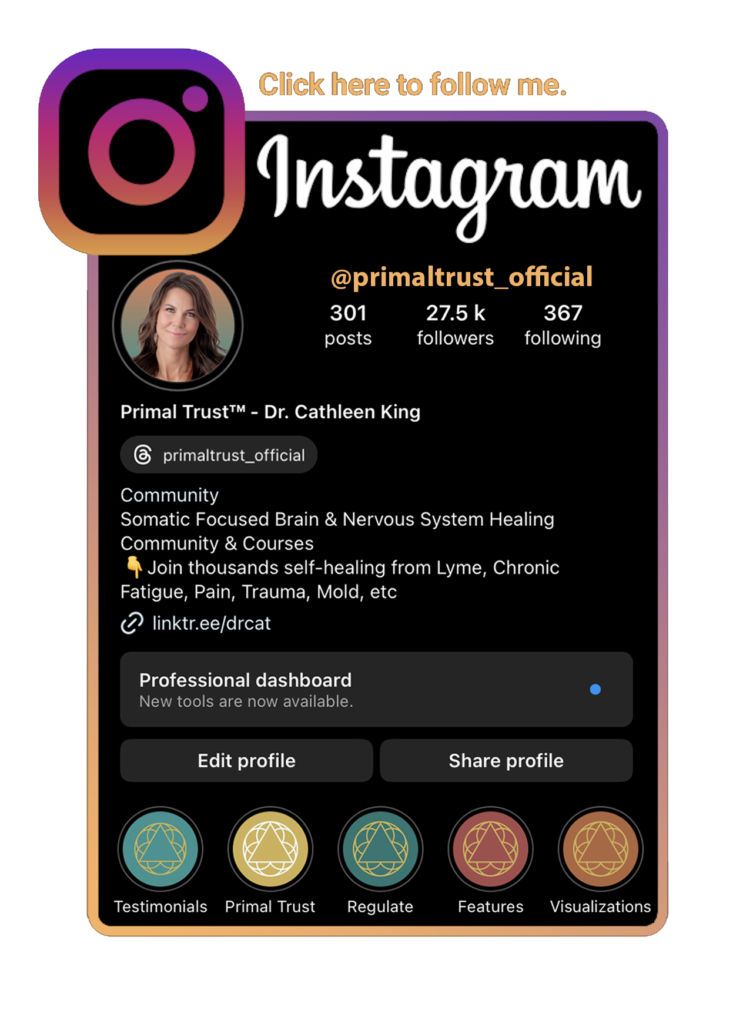Living with and healing from chronic health conditions is usually an extremely challenging journey, affecting not only physical well-being but also emotional balance. While conventional approaches often focus solely on physical symptoms, a holistic approach, addressing root cause issues such as nervous system dysregulation and limbic system impairment is something that we advocate at Primal Trust™.
Through our Level 2 Mentorship, we look to heal inner attachment wounding, re-pattern trauma responses and also explore something called Parts Work, which offers a unique perspective by recognizing and addressing the different aspects within ourselves.
In this blog post, we will explore the concept of Parts Work and its potential to help individuals with a very common chronic health condition that we see in our community, Chronic Fatigue Syndrome (CFS), and how this approach can be so powerful when doing the inner work to heal, along with things like brain retraining, vagus nerve toning and somatics.
Understanding the Importance of Parts Work in CFS:
Parts Work, also known as IFS therapy, involves recognizing and acknowledging the various aspects, or parts, within an individual’s psyche. Each part possesses its own set of beliefs, emotions, and desires. When it comes to CFS, these parts can operate at a subconscious level, influencing the limbic brain and the nervous system. Often, conflicting parts are at play, resulting in a push-pull dynamic that affects overall well-being.
Exploring an Example of Parts Work:
Olivia’s Journey with CFS: Let’s consider the case of Olivia, who is on a healing journey with CFS. Through engaging in Parts Work, Olivia discovers two primary parts within herself: the Achiever and the Protector. These parts significantly impact her energy levels and well-being, as neither are helpful, and they are conflicting. By tuning in and engaging in an internal dialogue, Olivia opens the door to understanding these parts and their underlying emotions and needs.

The Achiever part within Olivia is ambitious, driven, and carries high expectations. It urges her to push through fatigue, ignoring signals from her body to rest. Society’s expectations and the need to achieve career goals become paramount, overshadowing self-care. The Achiever part was a driving force that lead Olivia to burn out.
On the other hand, the Protector part manifests as concern for Olivia’s well-being, attempting to keep her safe. It discourages her from taking risks, urging her to conserve energy and avoid standing out or showing vulnerability. The Protector part is rooted in fear and feels overwhelmed quickly. It quite likely has a connection to a fragmented child part, which formed a belief pattern centred around not feeling safe in the world.
Resolving Parts Conflicts and Finding Balance:
Conflicts between parts, such as the Achiever and the Protector, are common in individuals with CFS. These conflicts can lead to a state of dorsal nervous system collapse, where the body is unable to repair itself or experience regenerative rest. The Achiever part may exhaust the sympathetic nervous system with heightened reactivity and anxiety, while the Protector part’s efforts to ensure safety may hinder true healing. This is a classic case of the nervous system experiencing “a foot on the gas and a foot on the brakes” at the same time, which we are able to explain through Polyvagal Theory.

To move forward, Olivia must find balance. By acknowledging the need for rest and finding higher and better ways to meet the needs of the Achiever, she can set realistic goals aligned with her energy levels. This approach reduces stress and fatigue, allowing her to focus on her core values and passions rather than external achievements or pleasing others (something we also focus on in Level 2 — True Self Identity, Core Needs, Values — see https://www.primaltrust.org/membership/).
Olivia also learns tools for nervous system regulation (Levels 1-2 of Primal Trust™), empowering her to communicate with her Protector part and assure it that she knows how to take care of herself. This is also key to developing what we call in the community the “Adult Main Personality”. Consequently, rest for Olivia becomes restorative and her energy starts to return, replacing the experience of “no energy” or feeling “wired but tired”, which are such common states in CFS resulting from HPA Axis (Hypothalamus/Pituitary/Adrenal) dysfunction.
When we can inform the nervous system and the limbic brain on a deep level that we are safe, and resolve the parts conflicts that are creating the maladaptive stress response within these systems, healing naturally occurs. This is of primary importance, and the clue is in the word “response”, which many neural retraining programs out there seem to miss — we don’t need to focus on talking to our limbic system when it is the responder not the creator of the distress! Instead, let’s go directly to the parts who need to feel safe, loved and ultimately be integrated into a healthy system.
The Power of Parts Work and its Potential in CFS:
Parts Work offers a truly transformative approach to the healing process of CFS, as it goes beyond merely addressing physical symptoms. By identifying emotional wounds or trauma through Parts Work, individuals can get to the root of their nervous system dysfunction. This process allows for the meeting of each part’s unique needs, promoting overall well-being and tapping into the restorative powers of mind-body practices that are so powerful. When we are no longer in conflict, either externally or internally, the body and the mind find calm, and by delving into Parts Work, individuals can deepen their brain retraining protocol, embracing a holistic path to healing.
And here’s the thing: in contrast to solely engaging the limbic system with brain retraining alone, Parts Work offers a comprehensive approach that acknowledges and integrates the wounded psyche and its various parts. Rather than bypassing emotions to reach an elevated state, we learn to gently connect with our body’s communication by listening to and meeting the needs of each part. It is here that we reach a state of wholeness and natural emotional elevation. The limbic system, after all, is really just responding to the disharmony and perceived threats from a wounded psyche.





